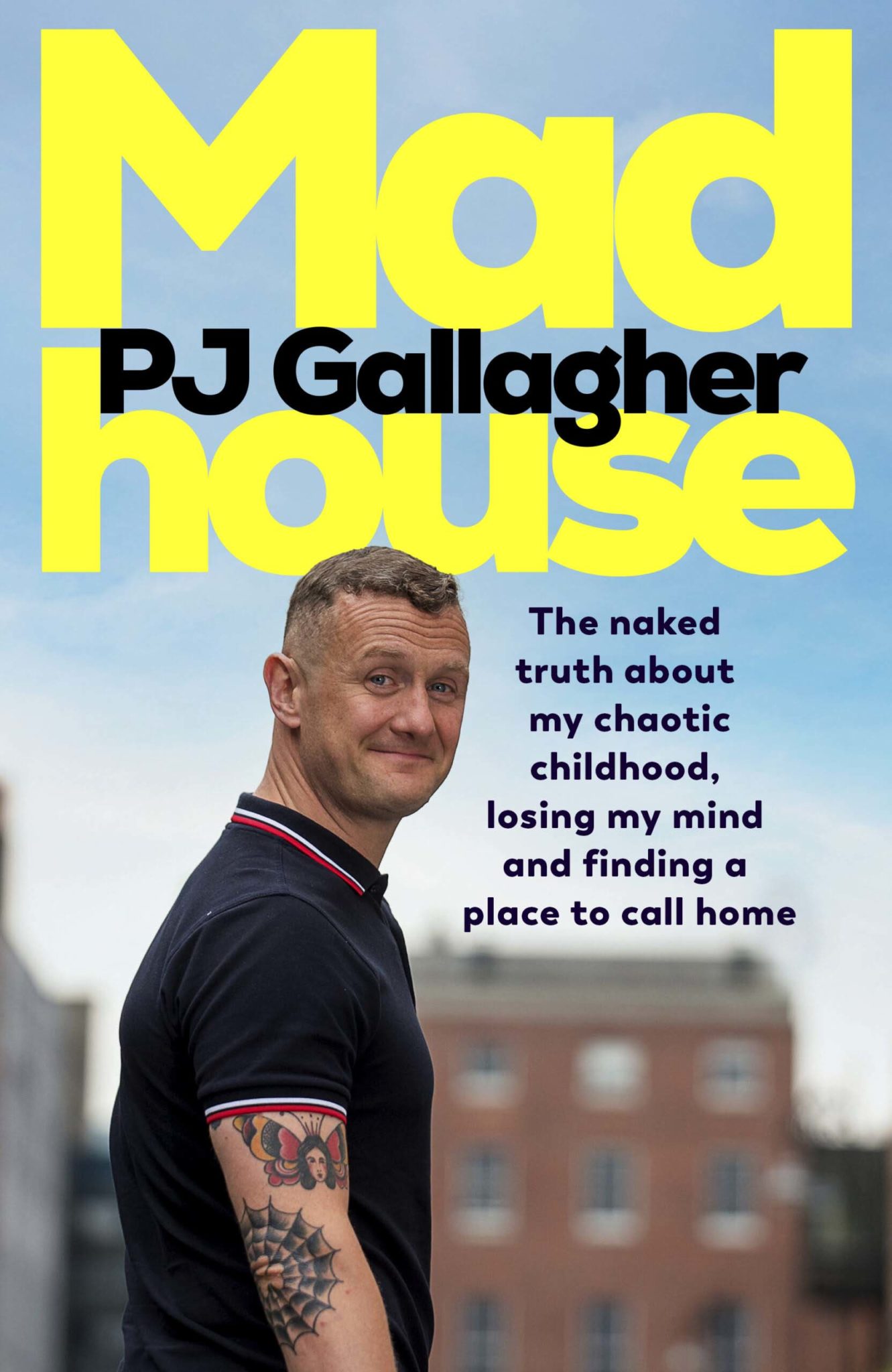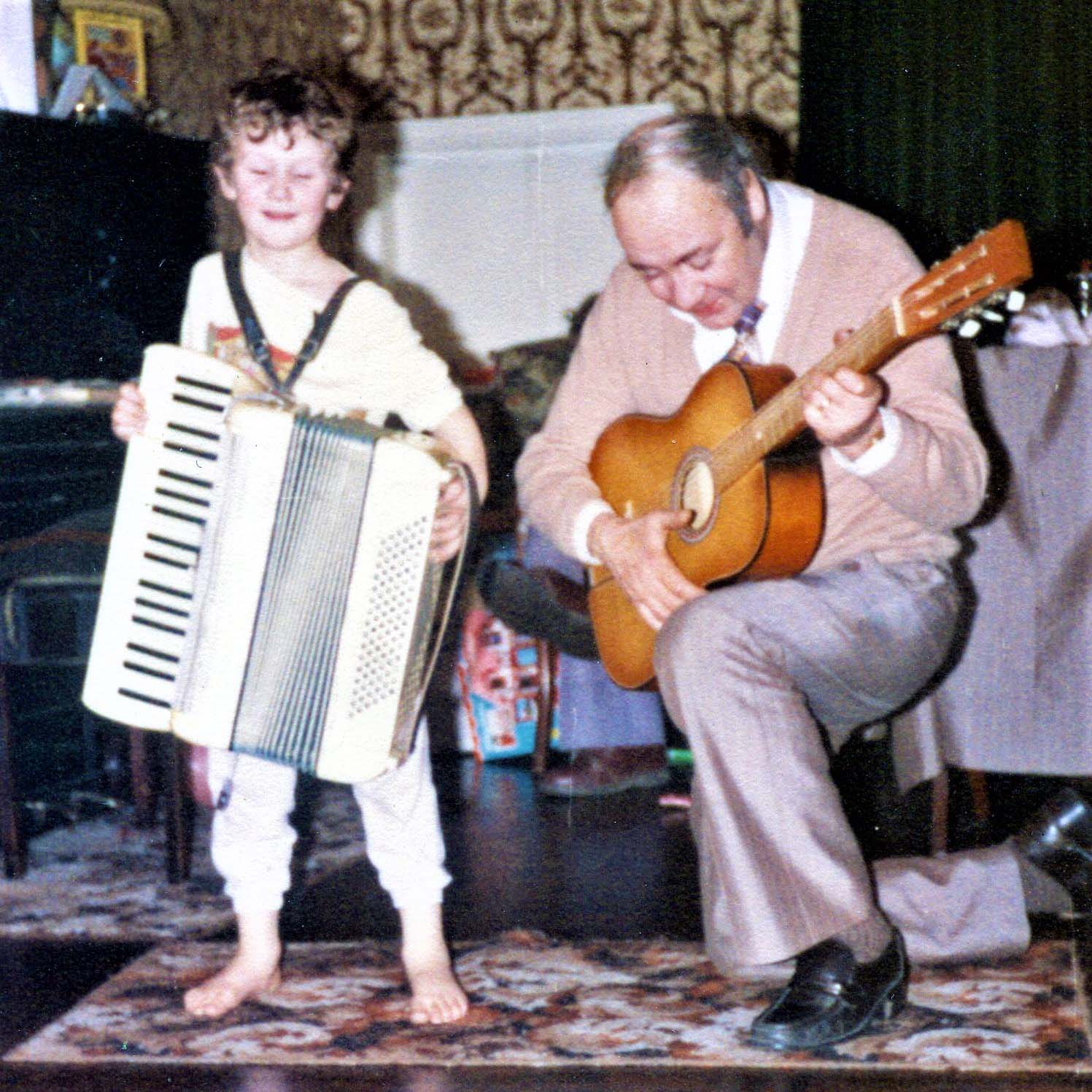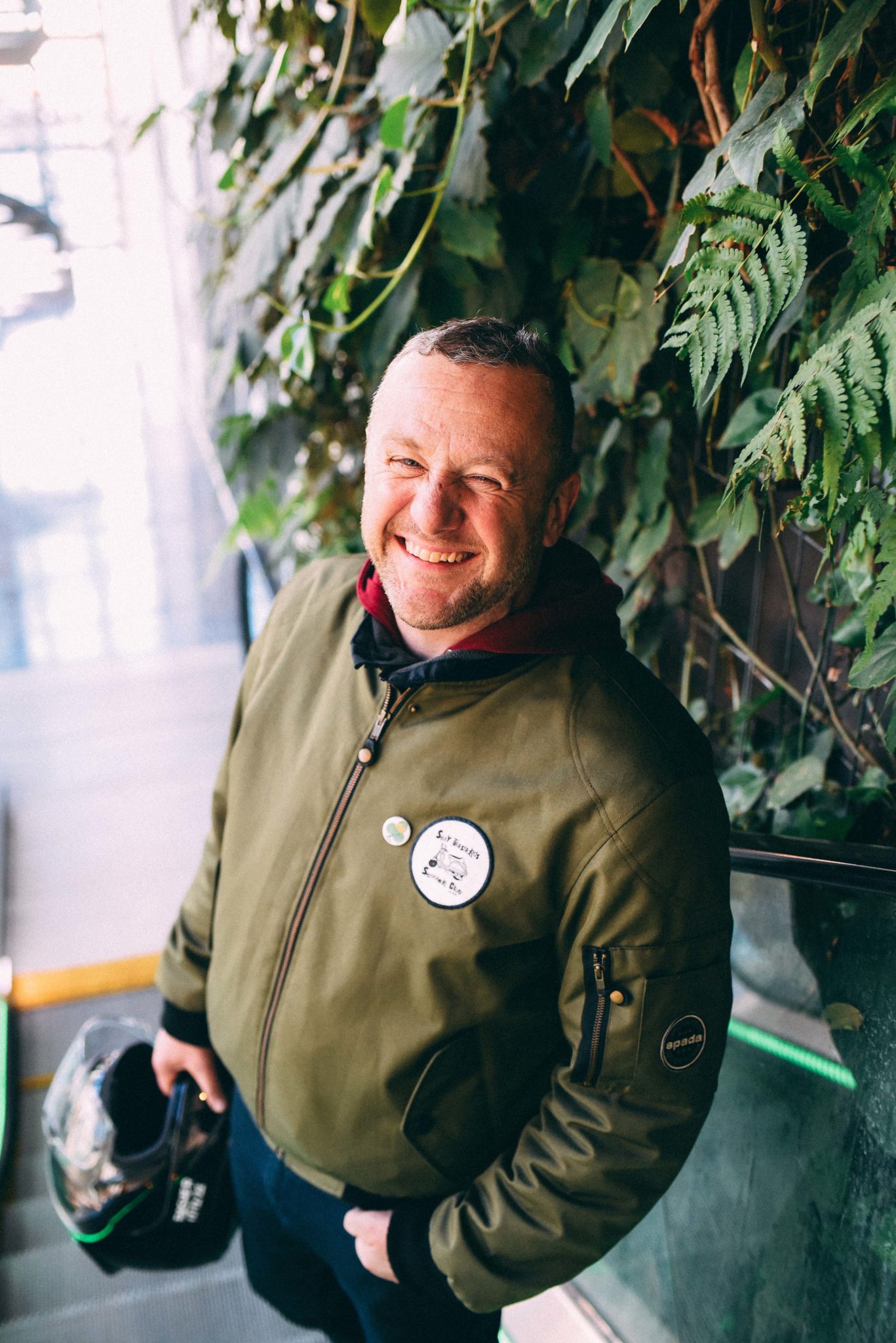- Culture
- 12 Dec 23

Comedian, broadcaster and actor, PJ Gallagher lets it all hang out in his unflinchingly honest memoir, Mad House. He discusses alcoholism, mental illness, adoption and becoming a father at 48.
P.J. Gallagher burst onto our screens in 2005 on RTÉ Two’s hidden camera comedy show, Naked Camera. Through his hilarious recurring characters Jake Stevens and Dirty Auld One, Gallagher quickly became a beloved household name. Now known for his role in the hit series The Young Offenders and his weekday breakfast show on Dublin’s Radio Nova, it’s hard to believe this happy-go-lucky smiler grew up surrounded by mental illness and addiction.
“Everyone has stuff about themselves the world doesn’t know,” he says. “Now it’s out there and everything is in it, it’s like holy shit, how is it going to be received? It’s scary because I didn’t really hold back with it. I threw everything at it.”
While ‘Mad House’ is a term many people throw about talking about their childhood home, PJ’s family home actually had six male adult psychiatric patients living in one half of the house. Yet this seems to be the least ‘mad’ thing about his story.

MY HEAD
Advertisement
In 2021, P.J. decided to go on The Late Late Show to publicly acknowledge why he had been off air and not seen publicly for months.
”I was having a mental breakdown and ended up in St Pats for three months. I was lying through me arse about it to anyone that was even asking questions,” he says.
”For me, the only thing actually worse than having the illness was people finding out. I was like, you have to lie, you have to lie, you have to lie. I was obsessed with the cover up.”
Before entering St Pats, PJ had reached his lowest point in his lifelong battle with depression and anxiety.
”I was within five hours of killing myself. I woke up one morning and I felt better than I’d felt for a long time because I knew I wasn’t going to go to bed again,” he admits. “I remember feeling that so clearly. All the arguing with myself, it’s all over. The argument had gone, the liar had won. I’d fully accepted it.”
A chance message from his friend Stefanie Preissner was the lifeline that saved his life.
“To this day I don’t know why I phoned her back... politeness maybe, because I actually didn’t want to but that message made all the difference.”
Advertisement
With this life-saving intervention, PJ still had to hang on another three weeks before he could be admitted to St. Patrick’s University Hospital. But even at such a desperate time he doubted his need for help.
”As soon as they said they’d take me I started thinking, I don’t think I’m sick enough... Like I wouldn’t even give myself that. ‘I just want to kill myself, I’m not that bad!’ When you think about it, it’s nuts.”
Having lived through the experience himself, PJ is currently making a documentary about what people can do when they or a loved one have a mental illness.
”Men in their fifties or sixties, particularly working class men, are excluded from the mental health conversation,” he says. “They’re not gonna put 70 or 80 quid into someone’s hand who they don’t know, for what they think is a load of shite when they really need the money more for their partner or kids.
”They’re the lads who are most likely to kill themselves because they actually think they’re doing people a favour. They’re the lads who are self-medicating with alcohol or who are functional addicts or not functional addicts. They’re the lads who are really at risk.”
He also addresses the important difference between mental health and mental illness.
”Mental health is getting in before you get to a point where you’re mentally ill and need to go to hospital,” he says. “You never say I’m physically ill or I’m suffering with my physical health, you say, ‘I have a heart problem or back problem or I have cancer’. Physical health is going to the gym.
Advertisement
”The way I see it is that I got hit by a figurative truck and came very close to death. If I was in hospital laying there with all broken bones and someone says, ‘I know how you feel, I missed out going to the gym last week,’ I’d fuckin shoot them’ (laughs). I don’t know where the line is, but I think mental health is what you do before you get sick and after you get sick, and the bit in the middle is the dangerous bit.”
PJ is very aware that the care he received isn’t available to all.
”I was very privileged in that I was able to access services, that’s not lost on me,” he acknowledges. “I was able to pay euro for health insurance. Then when the going got really, really tough and I finally decided I was going to try something, it still took three weeks to get into a hospital – that’s with all the private care, that was with everything. That’s as good as it gets.
”One of my friends called up to the house recently and said that he had made an attempt on his own life, but he just can’t afford to do anything about it. Pieta House is looking after him at the moment, but he’s 59 years old and he’s only suffering the past six years. He just can’t get access to anything. It’s hard to ask for help, then it can be too late – that’s the problem.”
THE DRINK
Growing up in a home with six psychiatric parents is one thing, adding two alcoholic parents into the mix takes it up a notch. Yet PJ doesn’t come across any way bitter towards his parents, Sean and Helen.
”No I’m not,” he says. “I was at the time, I was very bitter. I think I’m letting it go now. It wasn’t even bitterness that got me the most, it was fucking shame. That’s what really killed me about it. People would come to our house and not only were there all these other men living there, there was the alcohol problem. I never really dealt with it. I wouldn’t have really talked about it to anyone until I got sick. Shame nearly killed me when I got depression. There’s nothing special about it, there’s nothing unique about it, in fact it’s quite the opposite.”
Advertisement
While he’s unsure about his mother, PJ thinks his father’s alcoholism stemmed from a traumatic past.
”He literally used to scream in his sleep,” he says. “Over and over and over again, night after night. He would scream ‘Fuck off! Fuck off!’ Leave me alone!’ He was a dad in the ‘80s. You’re talking about a fella who was 28 with a comb-over, wore a full suit to the beach, like the lad was out of touch but not at all for his time. He must have been self-medicating. Whatever went on, I don’t know, I’ll never know. I didn’t really know him until he got cancer.
”Me Ma was just like every other ‘80s Ma; carrying the load, raising the family and on top of that she had six mental patients. She was never getting out of that unscathed.”
PJ’s mother Helen’s attitude changed towards him after he publicly acknowledged his mental illness. It brought them closer together.
”I think talking about it publicly gave my mam permission to sort of come out of her shell too,” he says. “It's great she did though, I’m glad. My Dad never did and that wound will never ever heal.”
 P.J with his adoptive father Sean (1990).
P.J with his adoptive father Sean (1990).Advertisement
MY BIRTH PARENTS
On top of his complicated relationship with his parents Sean and Helen, PJ had to wrap his head around meeting his birth parents in 2002. He always knew he was adopted and Helen encouraged him to make contact with his birth parents.
“She was always very encouraging, saying this is something you should do. Then of course she’d use scare tactics, ‘What happens if you end up marrying your sister? Or you get into a fight with your brother and ye battered the heads off each other?’”
PJ was grateful his birth parents took a leap of faith and were willing to meet him.
”They got a letter out of nowhere,” he says. “They didn’t know who I was, what I wanted or what I expected. It was a huge thing for them to do, much more so than for me. I’ve met people who’ve made contact with their birth parents and they’ve said absolutely not. But you don’t know how that person got pregnant, you don’t know what’s going on in their life. You don’t know if they have an addiction or if they’re in an abusive relationship. I have all my answers, so again, I’m privileged.”
POLYAMORY
While there are many twists and turns in PJ Gallagher’s autobiography, one part you don’t expect is his brief acknowledgement of his polyamory. He doesn’t get into it in any detail, so why did he mention it at all?
Advertisement
”I just don’t want to live any lies anymore,” he says. “It’s really that simple. I felt guilty about it and I’ve no reason to. I want a chosen family, my family is all fucked up. I believe in chosen families. I believe you can love two different people the same way I love my two kids, so I don’t want to hide that anymore.
”I fucked up relationships because people would look to me to be everything in their lives and I always felt so intimidated by that role. I couldn’t fulfil it. I would love someone and chase them, and then they’d say I love you back, and I wasn’t able to handle it. I’d fuck it up and throw it all up in the air. But now, I really believe that someone can say ‘I love you and him’ and it makes life easier on me. A lot of people who are neurodivergent feel that way. I’ve noticed that from being in the hospital too. Monogamy is for almost everybody.”
SINN FÉIN
Not knowing quite how to fit in is part of PJ’s story from an early age. As a young man, he found a sense of belonging becoming a member of Sinn Féin.
“When I look back, it’s not just the adoption thing, the alcohol thing or not fitting in in school, I think I got really nationalistic as a real desire to belong to something,” he explains. ”Getting involved in politics was like finding a tribe for me. At that time in my life, I was really confused and didn’t know what I wanted for myself. I was looking for a much bigger picture than me. It’s the same reason why I was crazy into the Dublin GAA.
“Sinn Féin was very different to what it is now,” he says. “It wasn’t profitable or popular back then. There were no TDs. There was one councillor in the whole country - Christy Burke. I was being observed by the special branch. It was a very different world. The dysfunctional elements suited me, I was able to relate to that. The non-establishment, the not fitting-in thing. But at the same time, you have all these peers that you can be with every day and a common goal.”
FATHERHOOD
Advertisement
PJ has become a proud first-time parent to twins (Milo and Stevie) with his partner Kelly at the age of 48.
”I’ll have my bus pass six months before they have their first pint,” he jokes.
Parenthood has changed his perspective massively and he knows what he wants for his kids.
”I definitely want to avoid ever being pissed around them. I never want to have a house where there’s shouting and screaming going on. The shouting and screaming and hiding and pissing in my own bed because I was afraid of what was going to happen next.
”Predictability – that’s what I’m aiming for, that’s the one thing I really want to do. I just want them not to be afraid of us. That’s the main thing.”
Advertisement
 PJ Gallagher. Copyright Miguel Ruiz.
PJ Gallagher. Copyright Miguel Ruiz.- PJ Gallagher brings his Born Lucky show to Vicar Street on April 14 and 25. Mad House is available now, via Penguin.










